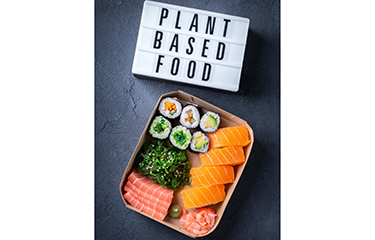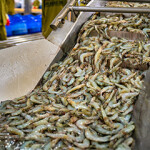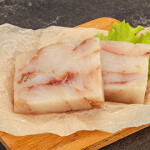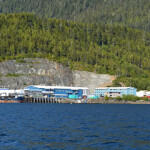SeafoodSource’s top 5 plant-based seafood analog stories of 2022

The growth of both the plant-based and cell-based seafood industries accelerated in 2022. With higher demand for seafood, and an increased number of focus on plant-based diets across the world, the industry saw a boom of activity.
SeafoodSource has highlighted the top 5 most-read plant-based seafood analog and cell-based seafood stories of 2022, which reflect on some of the strides made in the space over the year.
Number 5: Growth of alternative-seafood market drawing in large Latin American players
A Euromonitor report said it expects the plant-based and cell-based seafood market to be worth USD 23.2 billion (EUR 21.8 billion) by 2024 as more Latin American players join the market.
The two Latin American countries taking the lead on introducing the market to the region are Chile and Brazil. The Good Food Institute (GFI) awarded funds in March to researchers at the Brazilian Agricultural Researchers Corporation, starting a project to identify what qualifies as the “gold standard” for seafood products.
The Brazilian Agricultural Researchers Corporation collaborated with seafood supplier Fishtag to focus on seafood sustainability and traceability.
The data generated from the project will provide information regarding characteristics of conventionally produced seafood, to see how alternative seafood production can be quickly developed.
“My view is that the future of the food/protein industry will be cell-based. Hopefully, in 50 years, there will be no animals being killed for food,” Fishtag Head of Business Development Verônica Ribeiro said. “We are thrilled to be part of this project and hope that the fish we provide will help plant-based and cell-based developers create delicious seafood.”
Number 4: Handy Seafood debuts plant-based crab cake analog
In January 2022, 128-year-old seafood processor Handy Seafood launched its first plant-based crabless cake analogs to retailers and distributors internationally.
The appeal of the crabless cake is its affordability, entrée sized portion, and “crab cake-like texture,” Handy Director of Marketing Maureen Johnson told SeafoodSource.
“Crab cakes are at the very heart of our business and something that we’re passionate about. We put a lot of emphasis on providing consumers with the best-tasting products made with the highest quality ingredients. In terms of flavor and texture, our Plant-Based Crabless Cake is second to none in its category,” Johnson said.
Number 3: Thai Union aiming to become “strong player” in plant-based seafood analog sector
One of the world’s largest seafood distributors has joined the plant-based seafood analog movement, predicting to become a leader in its sector.
The Bangkok, Thailand-based company began marketing its own plant-based seafood brand in 2021, “OMG Meat."
“Decades of seafood experience and a strong culinary expertise have led us to a unique position to impact the plant-based seafood industry," Thai Union said on its website. "Driven by innovation, alternative protein technology and expertise, our applications span a wide space that are in varying stages of development. We have focused our internal efforts on plant-based proteins, such as alternative seafood and meats, while exploring emerging areas (insect proteins, lab-grown meats, etcetera) through collaboration and investments in start-ups."
Thai Union said it aims to meet the new the growing demand for plant-based seafood analogs.
Number 2: Data shows plant-based seafood analogs, cell-cultured seafood booming
Plant-based food analogs have risen rapidly in popularity over the past two years.
Data in March 2022 showed the rapid growth, with plant-based foods increasing 6.2 percent in 2021, according to the Plant Based Foods Association, the Good Food Institute, and SPINS.
Plant-based fish sales account for approximately 75 percent of the plant-based seafood analog market with sales, and plant-based shellfish showing growth of 9 percent in 2021.
However, seafood analogs are lagging behind other meat types.
“In contrast, more-developed categories like plant-based beef have hundreds of SKUs in the marketplace – more options, at varied price points, merchandised across departments including the fresh meat case,” Good Food Institute Corporate Engagement Project Manager Emma Ignaszewski said.
Even with the growth, plant-based seafood analogs accounted for only an estimated 0.1 percent of the total retail dollar share amount of all seafood products in 2021.
Number 1: Leo DiCaprio, Jeff Bezos, Blake Griffin part of Wildtype's USD 100 million funding round
Cell-based salmon start-up Wildtype based in San Francisco, California, U.S.A, received investments for its initial funding round from Bezos Expeditions, S2G Ventures Oceans, Seafood Fund, Robert Downey Jr.'s FootPrint Coalition, Cargill, many renowned chefs and athletes, and actor and environmental activist Leonardo DiCaprio.
The investments boosted Wildtype’s production capabilities as it prepares for its U.S. market launch, the company said in a press release.
Leo DiCaprio said the investment speaks closely to his advocacy for raising awareness to the threatened wild fish populations.
“Wildtype is the clear leader in cultivated seafood, which will give us the chance to protect our oceans while creating the cleanest seafood on the planet," he said.
Photo courtesy of Antonina Vlasova/Shutterstock






Share